Key takeaways
- Louisiana’s open primary system allows candidates from any party to compete on the same ballot, fostering inclusivity and diverse candidate representation.
- Party primaries serve as a vital mechanism for voter engagement, allowing citizens to express their preferences and address local issues.
- High voter turnout and community involvement are encouraged during primaries, inspiring discussions on political issues and candidate platforms.
- Future adjustments to the primary system may be necessary to reflect evolving voter demographics and preferences while maintaining transparency and trust in the process.
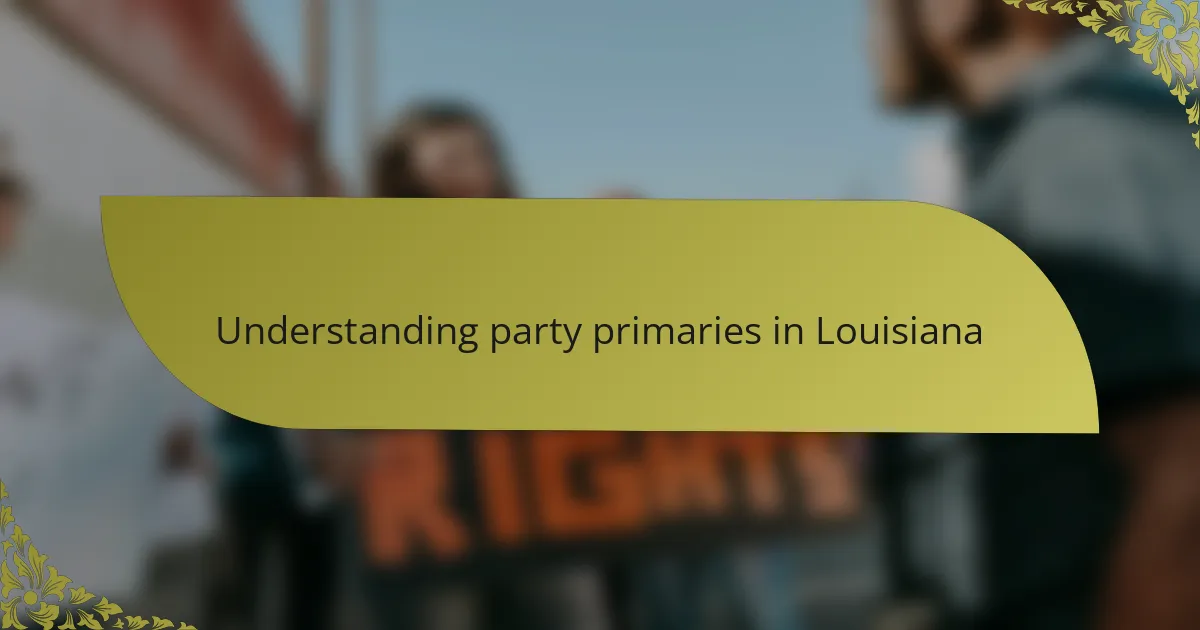
Understanding party primaries in Louisiana
Party primaries in Louisiana are a fascinating aspect of the electoral process that significantly influences the political landscape. Unlike many states, Louisiana employs a unique open primary system. This allows all candidates, regardless of party affiliation, to compete on the same ballot. I remember witnessing how this system can result in diverse candidate choices, fostering a more inclusive political dialogue.
One interesting detail is that if no candidate receives a majority of the votes in the primary, a runoff occurs between the top two vote-getters. This is critical in a state like Louisiana, where voter preferences can be vast and varied. From my personal experience, attending these runoffs can be quite exhilarating—the energy of engaged citizens coming together to make their voices heard is truly something special.
- Louisiana utilizes an open primary system.
- All candidates compete on the same ballot, irrespective of party.
- A runoff election occurs if no candidate achieves a majority.
- It encourages diversity in candidate representation.
- The system fosters increased voter engagement and participation.
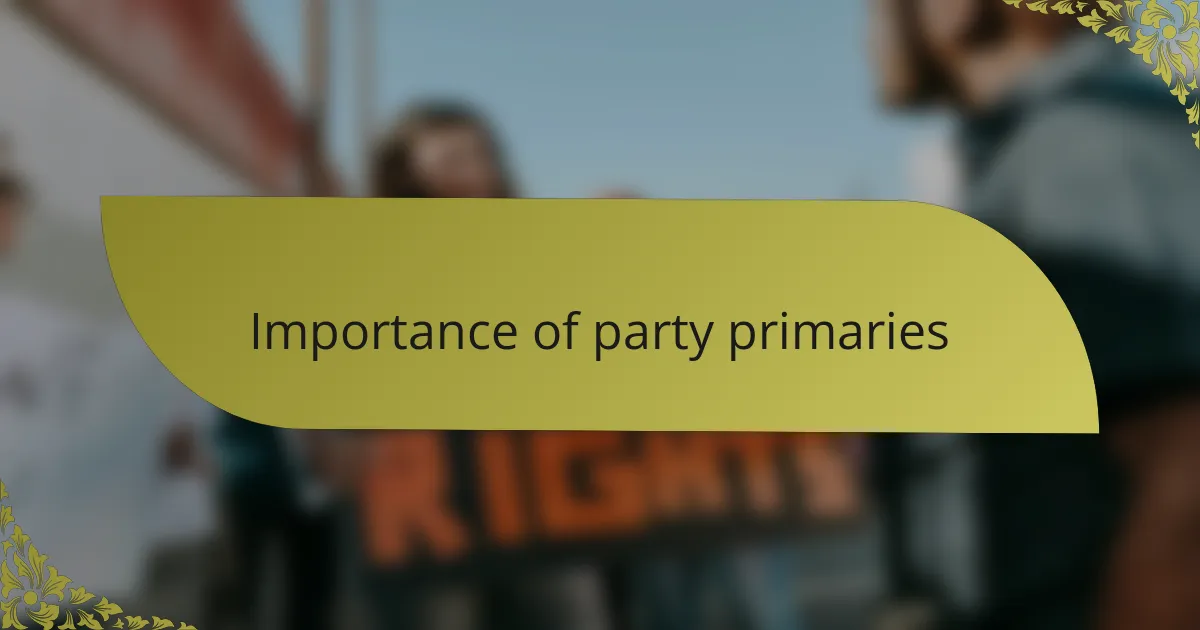
Importance of party primaries
Party primaries play a crucial role in Louisiana’s political landscape. They serve as a filtering mechanism, allowing party members to choose candidates who best represent their values and beliefs. I recall attending a local primary and feeling the palpable energy among voters, as it was clear that every individual’s voice mattered in shaping the choices ahead.
In my experience, the primaries also encourage voter engagement and can raise awareness of local issues that may not take center stage in general elections. It was inspiring to see grassroots movements rallying support for their chosen candidates, reminding me that every vote truly counts.
Here’s a table comparing the advantages and disadvantages of party primaries:
| Advantages | Disadvantages |
|---|---|
| Encourages voter engagement | Can lead to voter apathy if people feel their choices don’t matter |
| Allows party members to express preferences | May result in a divided party if the primaries are contentious |
| Highlights local issues and candidates | Possible lack of media attention compared to general elections |
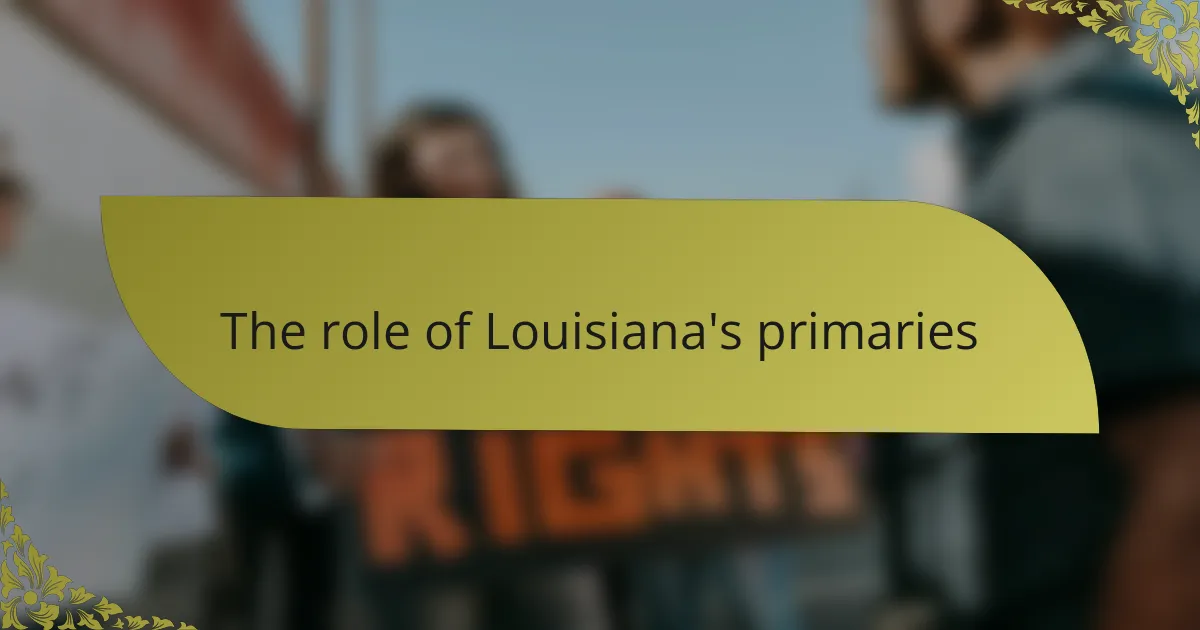
The role of Louisiana’s primaries
Louisiana’s primaries play a crucial role in shaping the political landscape of the state. In my experience, participating in these primaries has always felt like an intimate connection to democracy, allowing voters to have a direct voice in selecting candidates who will represent their values. The unique system of open primaries means that voters can choose candidates from any party, creating a more dynamic and competitive environment.
When I think about the implications of this system, I’m reminded of how it can spark lively debates among constituents. It encourages engagement, as people must research candidates from all parties. Here are some key aspects to consider regarding Louisiana’s primaries:
- Inclusivity: Open primaries allow registered voters to select candidates without party affiliation restrictions.
- Voter Turnout: High participation rates in primaries can invigorate local politics and foster a sense of community involvement.
- Candidate Diversity: The system encourages a broader spectrum of candidates, resulting in more choices for voters.
- Strategic Voting: Voters may strategically choose candidates from the opposing party in primaries to influence the general election outcome.
- Political Realignment: Primaries can shift the political landscape by promoting third-party and independent candidates.
Reflecting on these aspects, I believe that the role of Louisiana’s primaries is not only about electing officials but also about engaging citizens in meaningful political discourse.
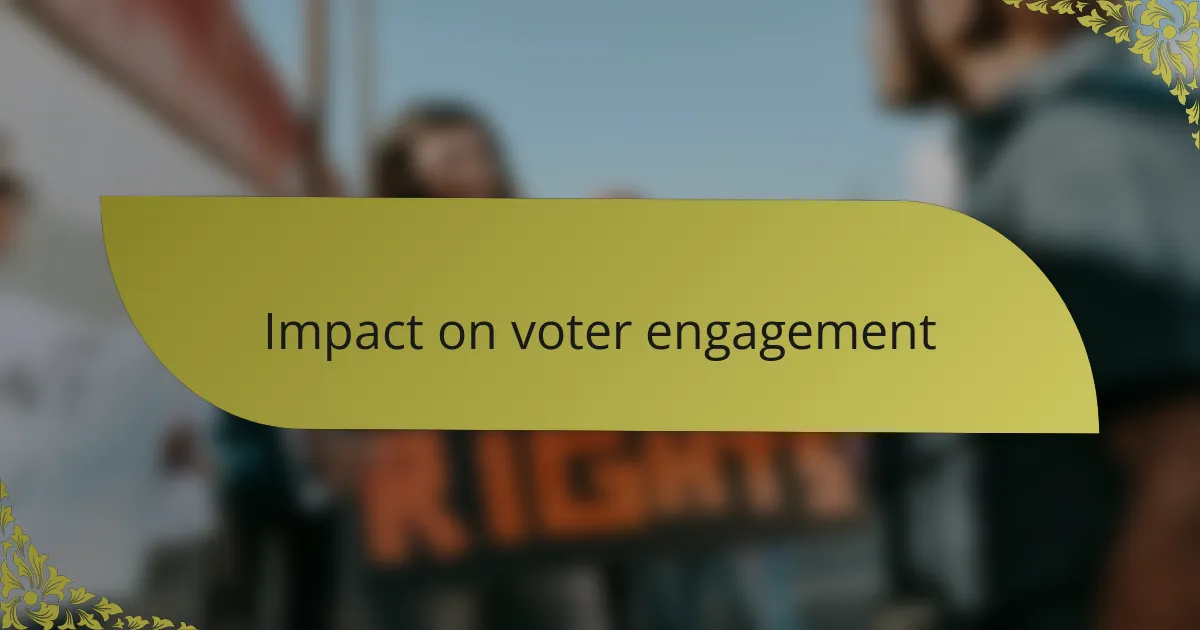
Impact on voter engagement
The impact of party primaries in Louisiana on voter engagement is significant. I’ve noticed, personally, that these primaries stir discussions among friends and family, prompting them to share their opinions and preferences more openly. This engagement not only helps to inform voters but also fosters a sense of community around shared political interests.
Moreover, the competitive nature of primaries can motivate individuals to become active participants in the political process. When candidates are vying for attention and support, it often ignites enthusiasm among voters who feel their opinions may actually influence the outcome.
Here are some ways party primaries impact voter engagement in Louisiana:
- Increased Discussion: Primaries encourage conversations about candidates, their platforms, and key issues, often making politics a dinner table topic.
- Higher Turnout: Engaging races can lead to higher voter turnout, as individuals recognize the importance of their vote in shaping the party’s choices.
- Youth Involvement: Younger voters often feel energized by primaries, which can lead to a larger presence of youth voices in the political landscape.
- Community Events: Campaigns often host events during primaries, creating opportunities for direct interaction with candidates and fostering community spirit.
- Education on Issues: Voters tend to educate themselves on candidates’ policy positions, enhancing overall political literacy.
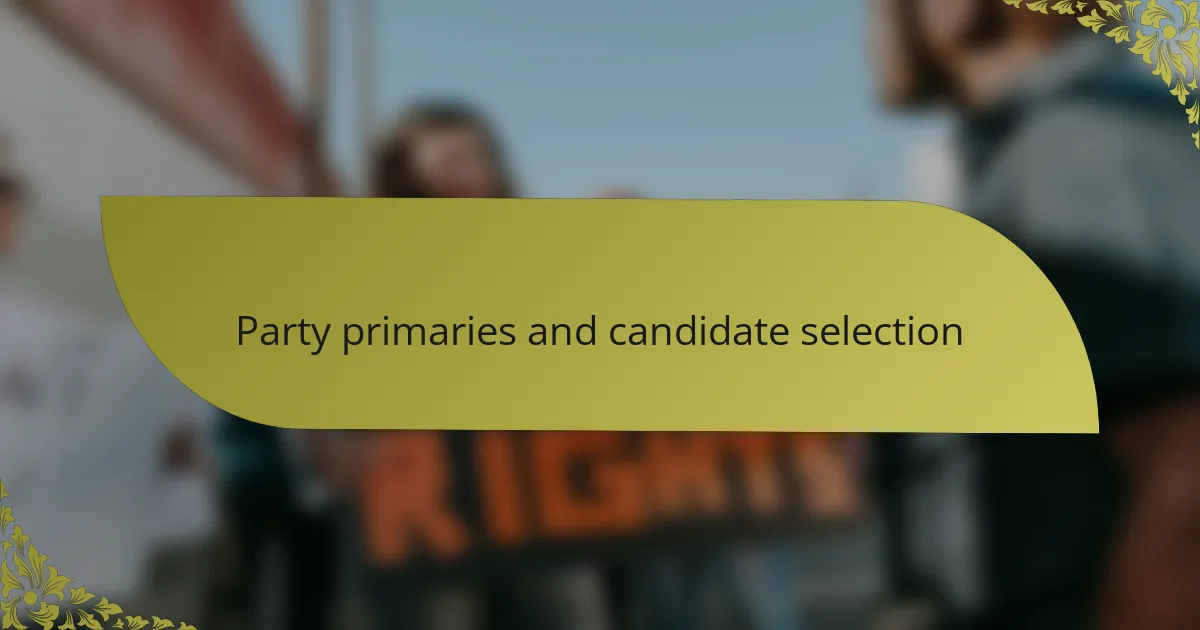
Party primaries and candidate selection
Party primaries play a crucial role in candidate selection in Louisiana. These primaries not only serve as a battleground for hopeful candidates but also allow voters to influence who will represent their party in the general election. From my experience, this process can generate excitement among party members, as they closely follow the candidates and their platforms.
However, the primaries can also be contentious. I remember witnessing a local election where candidates passionately debated issues that mattered deeply to their communities. It highlighted the stark contrasts between their visions. This engagement often energizes the electorate, making them feel invested in the political process.
When looking at the impact of party primaries, it’s essential to consider various factors. The table below compares aspects of open versus closed primaries, shedding light on how each format affects candidate selection.
| Open Primaries | Closed Primaries |
|---|---|
| Any registered voter can participate | Only registered party members can vote |
| Encourages voter involvement across party lines | Strengthens party unity and loyalty |
| Can lead to more moderate candidates | May result in more ideologically driven candidates |
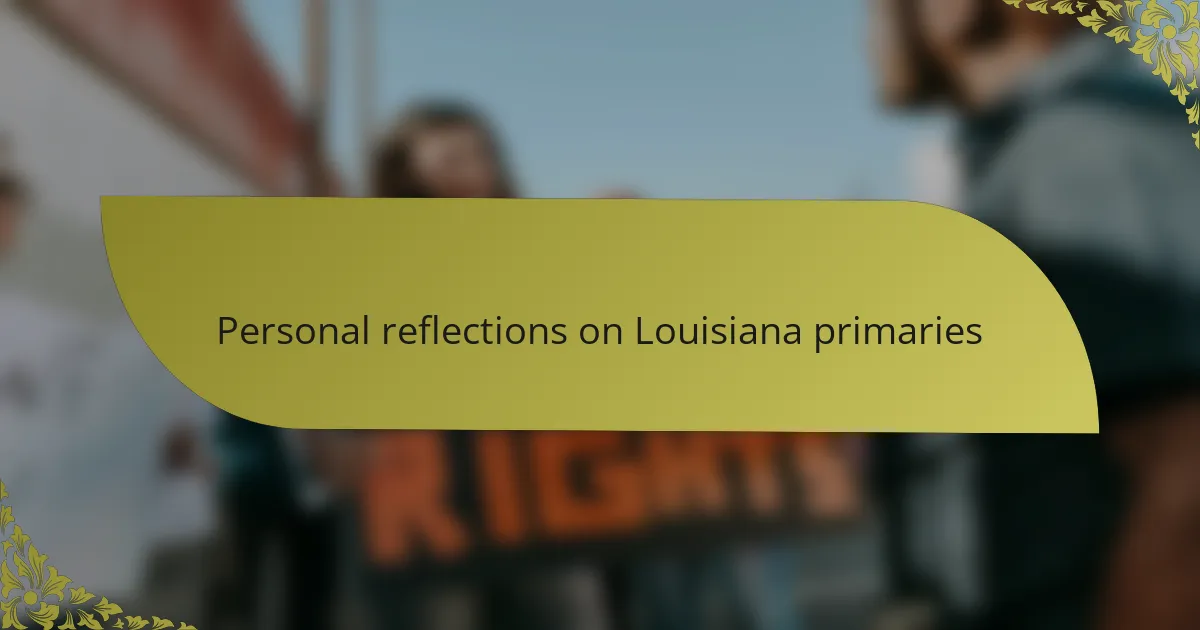
Personal reflections on Louisiana primaries
Participating in the Louisiana primaries has always felt like stepping into a vibrant tapestry of perspectives. I remember one primary season where I encountered voters passionately advocating for their chosen candidates, each sharing personal stories that reflected their values. Experiences like that remind me of how primaries can transform the mundane act of voting into a meaningful expression of identity and community.
I’ve often felt that primaries in Louisiana ignite a sense of urgency and excitement among voters. The prospect of a runoff serves as a reminder that every vote counts, pushing me to engage more deeply with the issues at stake. It’s inspiring to see friends and family not just casting their ballots but also discussing the merits of different candidates, exchanging ideas, and challenging one another’s viewpoints.
Reflecting on these moments, I can’t help but wonder: how can we sustain this energy beyond primary season? I believe that it’s essential for voters to carry this enthusiasm forward into the general elections, maintaining that connection to candidates and causes that resonate with them—after all, every election cycle presents a new chance to shape the future of our state.
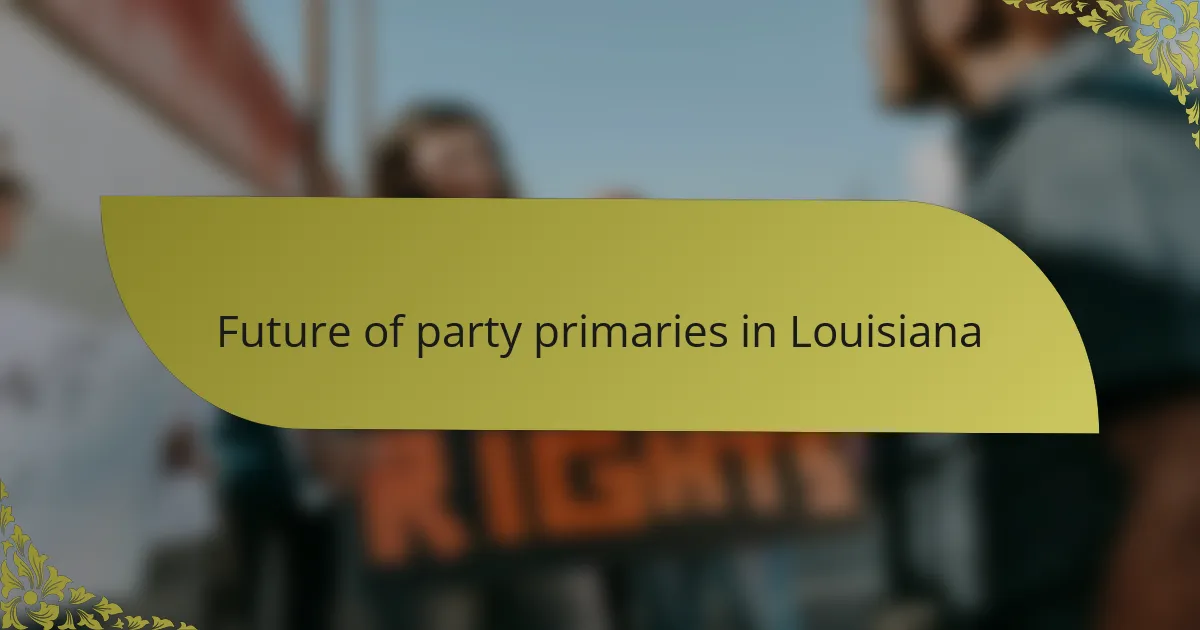
Future of party primaries in Louisiana
The future of party primaries in Louisiana appears to hold both promise and challenges. As the electorate becomes increasingly diverse and engaged, it’s clear that the traditional formats may need adjustments to reflect the will of the people better. From my observations, active involvement in these primaries will likely dictate how responsive candidates are to the issues that really matter to voters.
Moreover, the evolving dynamics of political alliances and voter preferences could reshape party strategies in significant ways. I’ve witnessed firsthand how grassroots movements can influence candidate selections, and I believe this trend might amplify. The emphasis on transparency and voter education will also be crucial for fostering trust in the primary process moving forward.
| Aspect | Current Situation |
|---|---|
| Voter Engagement | Increasing due to awareness campaigns |
| Candidate Diversity | Growing representation of various demographics |
| Primary Format | Needs modernization to improve participation |